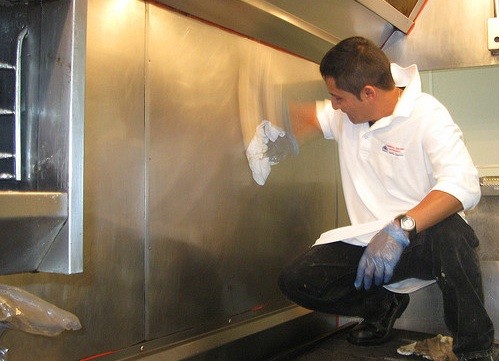Earlier this spring a local web developer made a surprising observation: The owner of a commercial cleaning business had strolled in and asked for a completely revamped website to better reflect his booming business. Yes, booming.
That was an eyebrow-raiser, and a week or so later I read a feature story about an East Coast businessman who had just sold his cleaning company for a hefty sum. It added to my interest in the vast, multi-layered industry that comprises everything from residential maid service to executive hotel housekeepers to junk-removal services, janitors and haz-mat haulers. Not to mention suppliers of the tools, motorized equipment, liquids and powders that professional cleaners use, and the final resting places of the trash they remove.
Mopping up after ourselves is a huge business and one that – especially amid this spring-cleaning time of year – is fertile ground for economic angles and business features on just about any beat.
If you cover manufacturing, for example, you might want to look into commercial waste; by some accounts, garbage is an economic indicator, as a VailDaily article from January points out. It’s a great story that points out the area’s plummeting construction debris figures, compares current trash tonnage figures to previous years and notes that less landfill fodder means higher trash fees.
And this older Bloomberg story, citing data from the American Association of Railroads, says that more waste freight cars on the tracks can be a sign up economic uptick as factories and plants generate more scrap and trash.
Meanwhile, if you cover lodging, transportation, tourism or even personal finance, check into hiring of housekeepers and cleaners by airlines, hospitality firms, restaurants, theme parks and other attractions. Does the level of demand for cleaners and janitors reflect expected traffic this summer? The IEHA, an 82-year-old professional organization for executive housekeepers, may be able to point you to local members not only in the hotel sector, but hospital and office markets as well.
New cleaning technology and standards (particularly at restaurants dealing with ever-growing ranks of allergic patrons, and hotels combating superbugs) could be a fascinating read. Here’s a story from HotelManagement.net about things like tray-detection technology that reduces the prevalence of those unsavory-looking half-eaten plates on hotel hallway floors. Commercial housekeeping software, iPods and other devices are helping whisk hotel rooms into shape, too. Find out what’s the latest at properties near you.
Consider stories about cleaning as a career or job option. Why, for example, are hotel housekeepers almost exclusively female? What tactics do they employ for personal safety, or to avoid on-the-job injury? What about unionization efforts on behalf of cleaning workers? Wages are low, according to this interesting Bureau of Labor Statistics page on Maids and Housekeeping Cleaners. Check it out for some fascinating interactive maps showing the employment of maids by state and metro area, along with local wage information. The BLS also publishes separate reports on related occupations like janitors and building cleaners.
Other lines of business need cleaners, too. Here’s a real estate firm reportedly hiring 200 people to spruce up its vacation rental properties. And with no end in sight to the industry of foreclosed homes, why not look into the so-called “trash out” services that clear abandoned houses out on behalf of banks and investors? And for a twist on that, view this WSJ blog post from earlier this month, citing a National Fair Housing Alliance study that accuses banks of letting homes in poorer or minority areas go to seed, while at the same time keeping homes in affluent white neighborhoods well-maintained. That would be a fantastic story to localize.











